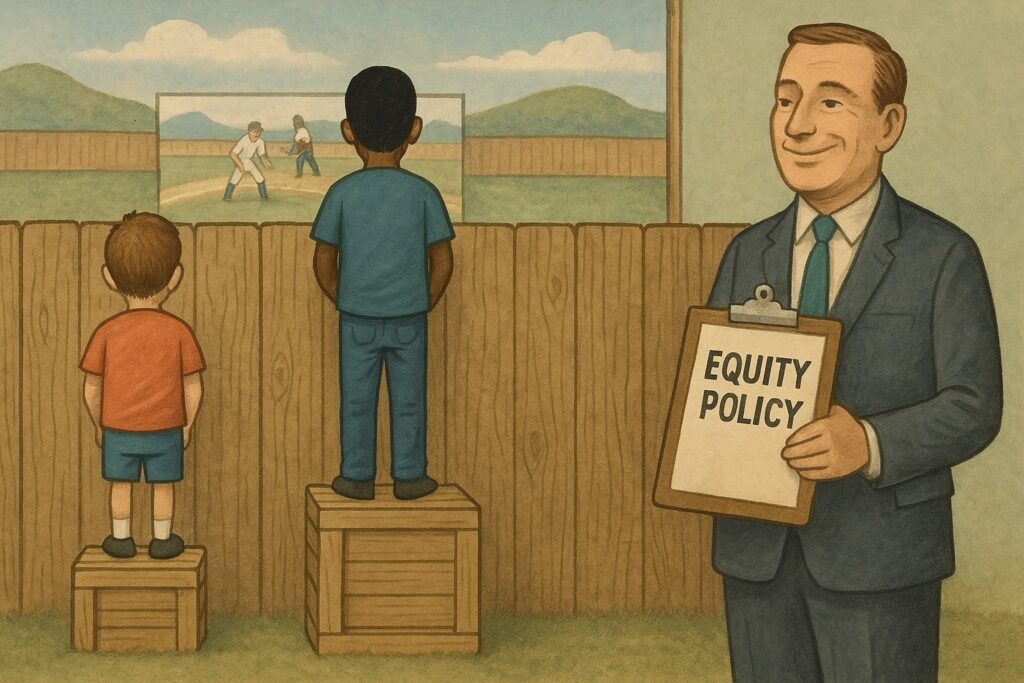Equity – From Equality to Engineering Outcomes
The Word That Changed the Debate
Once, politics was about equality — the simple idea that everyone should be treated the same under the law. Then came equity.
Equity sounds like equality’s kinder cousin, but in practice it’s very different. Equality is about opportunity. It is about outcomes. That shift has quietly transformed schools, workplaces, and politics into laboratories for social engineering.
The language is fairness. The reality is quotas, bureaucracy, and permanent grievance.
Table of contents
What Is Equity?
- Equality: Everyone gets the same rules and opportunities.
- Equity: Everyone must end up in the same place, even if it means tilting the rules.
Equity assumes that if outcomes differ between groups, the system must be unfair. Instead of fixing poverty, education, or opportunity, equity policies often just reallocate rewards until the numbers look balanced.
Buzzwords of Equity
Equity campaigns come with their own dictionary:
- “Level the playing field” – Code for shifting resources to engineer outcomes.
- “Systemic barriers” – Any gap in results becomes proof of hidden oppression.
- “Representation targets” – Quotas by another name.
- “Inclusive excellence” – Excellence redefined as demographic balance.
The words sound harmless, but each one comes with bureaucracy, paperwork, and costs that fall on someone else.
How it Shows Up in Practice
Equity isn’t theory anymore — it’s everywhere:
- In Schools: Admissions policies altered to engineer diversity, even if merit suffers.
- In Hiring: Quotas and targets in government, corporate boards, and HR departments.
- In Law: Hate speech and anti-discrimination policies rewritten around outcomes.
- In Healthcare: Treatment prioritised by group identity to correct “historic disparities.”
The goal is never simply fairness. It’s outcome management, with identity categories as the measuring stick.
Why Politicians and Corporations Love it
- Politicians get easy moral credit by promising fairness, without solving harder issues like inequality or wages.
- Corporations adopt equity pledges to polish their brand, often cheaper than reforming pay scales or tax practices.
- Universities create whole bureaucracies around equity, generating jobs for administrators and consultants.
Equity provides moral cover while leaving deeper problems untouched.
The Consequences
- Division: People are sorted into groups, not treated as individuals.
- Resentment: Quotas and preferences fuel backlash from those left out.
- Bureaucracy: Entire departments spring up to manage outcomes, with little accountability.
- Distraction: Real inequality (like wealth gaps) gets buried under identity politics.
Equity claims to create fairness, but often just creates new unfairness.
Why It Matters
Equity has quietly replaced equality as the moral standard in politics, business, and education. That shift changes everything:
- From equal treatment to engineered outcomes.
- From universal rights to group entitlements.
- From freedom to succeed to permission to succeed.
It’s not about lifting everyone up. It’s about managing society by spreadsheet.
From Fairness to Control
Equity sounds like progress. In reality, it’s a tool for bureaucracy and politics to control outcomes. What began as a promise of fairness became a framework for quotas, paperwork, and moral theatre.
Equality asked for freedom and equal rules. Equity demands results — no matter the cost.
FAQ
What’s the difference between equity and equality?
Equality means equal rules and opportunities. It means engineered outcomes to balance group results.
Why is equity controversial?
Because it replaces fairness with quotas, treating people as categories rather than individuals.
Where do we see equity in practice?
In schools, hiring, HR, law, healthcare, and corporate pledges.
Why do corporations promote equity?
Because pledges are cheaper than solving deeper issues like low wages, inequality, or tax avoidance.
What’s the risk of equity policies?
They create division, resentment, and bureaucracy while ignoring real structural inequality.



